
French postcard by A.N., Paris, no. 510. Photo: G.L. Manuel Frères.
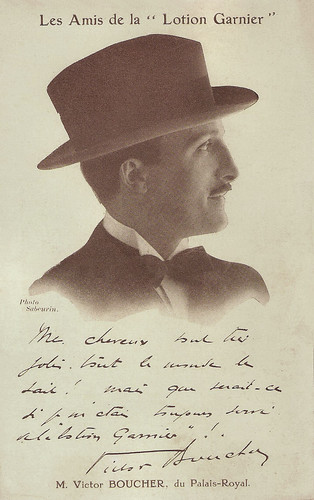
French postcard by Les Amis de la "Lotion Garnier". Photo: Sabeurin. Caption: M. Victor Boucher, du Palais-Royal.
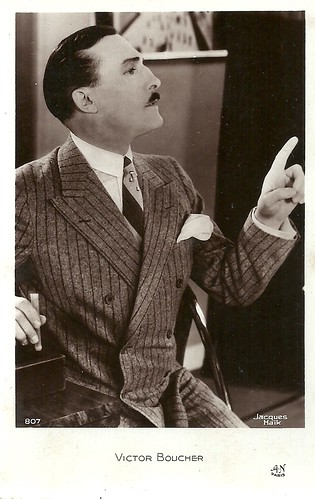
French postcard by A.N., Paris, no. 807. Photo: Jacques Haïk.
Talent as a comedian
Victor Louis Armand Boucher was born in 1877 in Rouen, France, in a house in the Rue Saint-Étienne-des-Tonneliers. His parents ran a café-restaurant in Bihorel.
As a child, Victor Boucher is fascinated by the theatre shows in his hometown. At the age of 10, he was admitted to the Cercle de jeunesse, where he started to act. After working as a bookkeeper in Rouen and doing his military service, he moved to Paris.
On the recommendation of the composer Edouard Mahé, he ended up obtaining an engagement at the Théâtre des Capucines. In 1902, Victor Boucher married Mariotta Claire at Neufchâtel-en-Bray.
He knows his first success at the Théâtre des Mathurins in the play Kangourou, where actor-director Sacha Guitry spotted him. In 1905, he was lucky to replace an ill actor in the play 'Nono' at the Théâtre des Mathurins and soon he became known for his talent as a comedian. From 1905 to 1907, he performed at the Theatre de Vaudeville, from 1907 to 1908 at the Theatre de la Renaissance, and so on.
In 1913 Victor Boucher also started to act in the cinema. He made his film debut in La Petite Chocolatière/The Chocolate Girl (1913) by André Liabel, followed by L'Idée de Françoise/The Idea of Françoise (Emile Chautard, 1914) with Renée Sylvaire. However, in the 1920s, he was foremost a stage actor, first at the Théâtre du Gymnase, and later at the Théâtre de la Michodière.
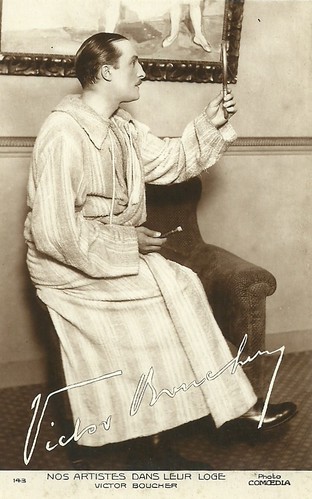
French postcard. Nos artistes dans leur loge, No. 143. Photo Comoedia.
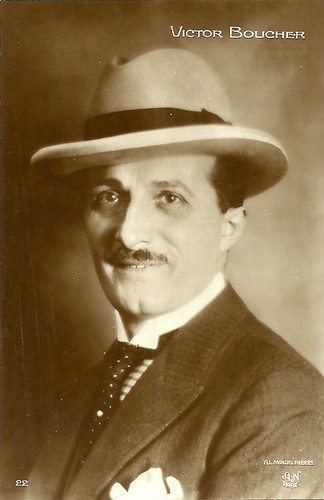
French postcard by A.N., Paris, no. 22. Photo: G.L. Manuel Frères.
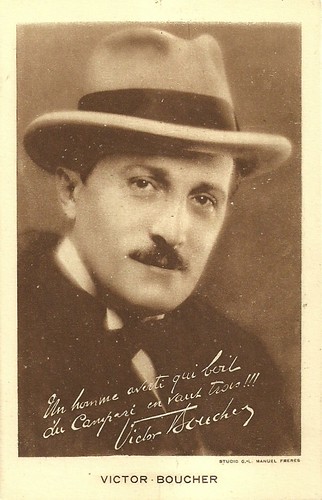
French postcard for Campari. Photo: Studio G.L. Manuel Frères. Caption: "Un homme averti qui boit du Campari en vaut trois!!!" (A man forewarned who drinks Campari equals three).
Prolific film actor
In 1927, Victor Boucher became the manager of Théâtre de la Michodière, which became his fixed theatre between the late 1920s and 1940. Boucher also became chair of the Association des artistes dramatiques.
When the sound film arrived in France, Boucher became a prolific film actor as well. He played in such early sound films as La douceur d'aimer/The Sweetness of Loving (René Hervil, 1930) and Gagne ta vie/Earn your life (André Berthomieu, 1931) with Dolly Davis. He then starred in the comedy Les vignes du seigneur/Our Lord's Vineyard (René Hervil, 1932) with Simone Cerdan and Victor Garland.
Most of the light comedies Boucher made between 1930 and 1941 are now forgotten. None made it into the canon of French film history. In the comedy Le sexe faible/The Weaker Sex (Robert Siodmak, 1933), Boucher is a stylish butler who is involved in the intrigues of his patrons. It was based on a 1929 stage farce of the same name by Édouard Bourdet, and his co-stars were Mireille Balin and Pierre Brasseur.
Boucher also acted opposite Mona Goya in La Banque Némo/Nemo's Bank (Marguerite Viel, 1934). He played a man, who rises from the gutter to become a leading banker. His involvement in dishonest financial dealings threatens the collapse of his empire, but he is rescued by the various politicians who have interests in the firm. The plot has strong similarities to the Stavisky Affair which took place the year the film was released.
In the late 1930s, Victor Boucher was often paired with Elvire Popesco, such as in L'habit vert/The Green Jacket (Roger Richebé, 1937), a farce set against the backdrop of the Académie française, a philanthropic organisation created in 1940 by Baron Taylor. His last film was the comedy Ce n'est pas moi/It's Not Me (Jacques de Baroncelli, 1941) with Jean Tissier and Ginette Leclerc. In 1942, Victor Boucher died in Ville-d'Avray, France, from a heart attack. He was 64. Christian Grenier at l'Encinematheque: "Victor Boucher was a lovable man, a generous man, highly esteemed in the trade."
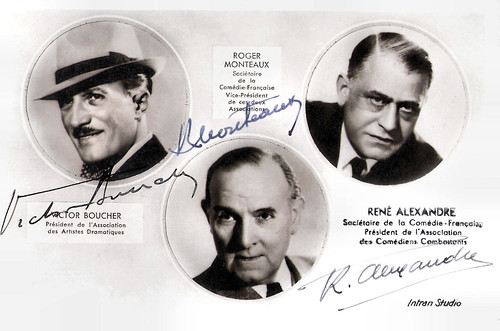
Victor Boucher, Roger Monteaux and René Alexandre. French postcard. Photos: Intran Studio.
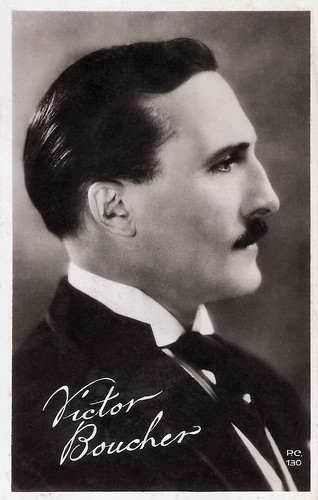
French postcard by P.C., Paris, no. 130.
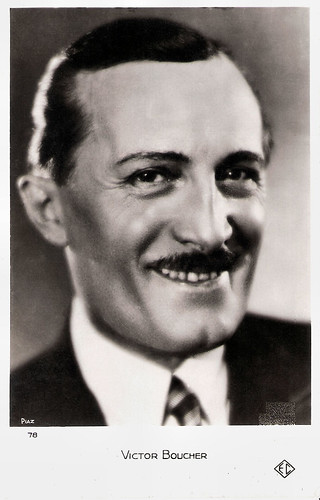
French postcard by Éditions Chantal (EC), Paris, no. 78. Photo: Piaz.
Sources: Christian Grenier (l'Encinemathèque - now defunct), Wikipedia (French and English), and IMDb.
This post was last updated on 23 July 2023.
1 comment:
Gorgeous!
Post a Comment